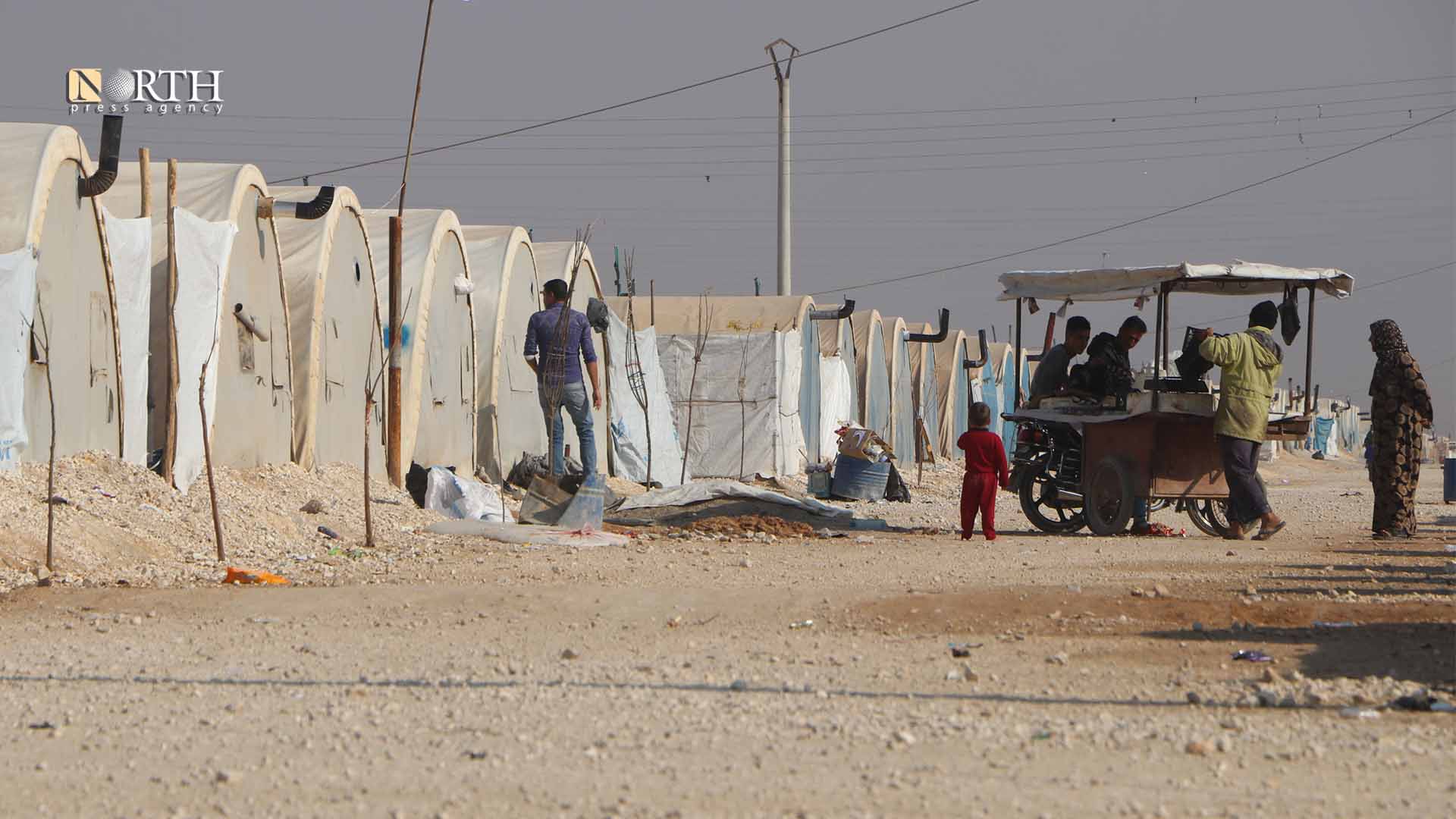HASAKAH, Syria (North Press) – Local officials responsible for IDPs and camps in Syria’s northeast said depriving those who fled the Turkish attacks of humanitarian aid and the ongoing suspension of the UN mandate on aid access through al-Ya’rubiyah/Tel Kocher crossing is due to the use of the relief issue as a political card against the Autonomous Administration of North and East Syria (AANES).
The ongoing suspension of the UN mandate regarding the aid access through al-Ya’rubiyah crossing increased burdens of Syrian IDPs especially those of Sere Kaniye (Ras al-Ain) and Tel Abyad, co-chair of the Washokani Camp, west of Hasakah, Barzan Abdullah, said.
The international humanitarian organization such as United Nations High Commissioner for Refugees (UNHCR) and International Committee of the Red Cross (ICRC) do not provide those camps with services, as the Syrian government has prevented the licensed organizations in areas held by it from entering these camps, according to Abdullah.
The Turkish invasion of Sere Kaniye and Tel Abyad in October 2019, displaced more than 300,000 people, most of them Tel Abyad IDPs who settled in the city of Raqqa and its villages in addition to Tel al-Samen camp, north of Raqqa.
Although the AANES constructed these camps and prepared the infrastructure including the services and tents, but the IDPs are complaining about the lack of relief especially food, medical needs and education projects.
Winter requirements
Abdullah referred to the outworn tents and winter requirements that have not been secured yet, because of the halt of UN aid entry through al-Ya’rubiyah crossing for the IDPs for two years.
Days ago, the co-chair of Sere Kaniye Camp, Aziza al-Khanafer, told North Press that they also did not distribute winter requirements due to “lack of sufficient capabilities.”
Meanwhile, head of Washokani Camp noted that the content of the food basket is always decreasing and it can hardly meet the needs of the IDPs.
Local supervisors try their best to reduce the harm of international organizations not reaching the camps, but “politicizing the aid by the government is a real obstacle,” he said.
In July 2020, the al-Ya’rubiyah/Tel Kocher crossing was closed to UN humanitarian access to north and east Syria due to the veto of Russia and China, which exacerbated the challenges facing the region, according to civil organizations.
Restrictions on aid deliveries from Damascus and Iraq are preventing medical supplies and personnel needed to prevent, contain, and treat Covid-19 from reaching two million people in northeast Syria, Human Rights Watch said.
Meanwhile, the Russian veto prevented the UN and its agents operating in the region from dealing directly with the AANES or reauthorizing the mandate to aid access through the al-Ya’rubiyah crossing.
Therefore, the vulnerable have been kept in mercy of the government will and policy through selecting projects and imposing conditions for partnership with local bodies linked to the Syrian security services, the AANES said in a statement in August.
Seven local organizations visit Washokani Camp while others head towards Deir ez-Zor and Raqqa, “but their capabilities are poor and provided aid are so little.”
The Washokani Camp is a house for about 30,000 people numbering 5,000 families “and it is not a small number,” Barzan Abdullah said.
However, the available services do not match with the number of residents in light of the outbreak of coronavirus pandemic alongside with leishmaniasis.
“Artery cut by veto”
Sheikhmous Ahmad, co-chair of the Refugees and IDPs Bureau of the AANES, described the al-Ya’rubiyah crossing as a main artery to the UN aid access that was closed due to the Russian veto.
“The region is besieged by Turkey and the Turkish-backed factions from the north and by the Syrian regime and its supporters from the south,” according to Ahmad.
“Unfortunately, humanitarian issues have been used in political conflicts and agenda,” Ahmad said referring to the suspension of the UN mandate for the aid entry mechanism through the al-Ya’rubiyah crossing.
“So far, Russia is using the crossing as a card to pressure the AANES in order for the latter to compromise in favor of the Syrian government or Russia,” he added.
According to Ahmad, the UN did not adopt any of the IDP camps in the region especially the camps that house IDPs of Sere Kaniye, Tel Abyad and Afrin “in the framework of the implementation of political agenda.”
“The UN provides the Hawl and Arisha camps in Syria’s northeast with support,” co-chair of the Refugees and IDPs Bureau of the AANES noted.
Hawl Camp includes thousands families of the Islamic State Organization (ISIS) in addition to Iraqi refugees and Syrian IDPs, while Arisha Camp includes IDPs of Deir ez-Zor.
“However, the policy of double standards regarding the UN assistance issue has become obvious in camps of Afrin, Ras al-Ain and Tel Abyad IDPs, who fled their lands due to Turkish occupation,” Ahmad noted.

